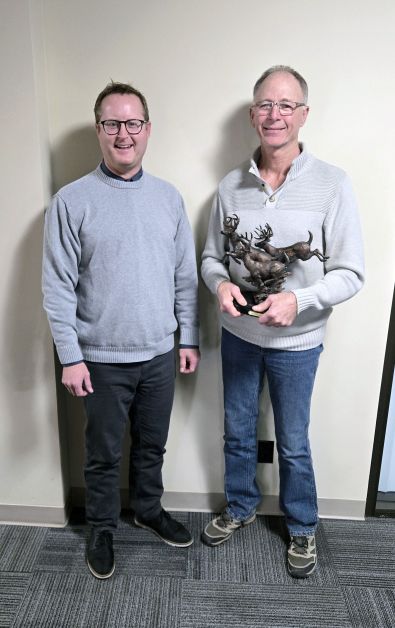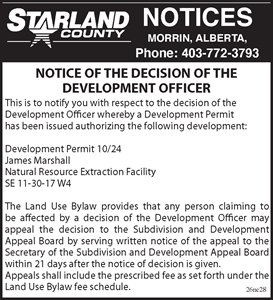
Special Areas Advisory Council held their last meeting in 2024 in Hanna. The group discussed emerging issues and provided direction on the 2025 budget, road program, and key policies.
Chair Jordon Christianson presented Daryl Swenson with a small gift to thank him for his 10 years serving on the Board. Earlier this year Daryl completed his term on the Board as the Special Area No. 3 representative; he continues to serve on Advisory Council as representative for Special Area No. 2 – Subdivision 7.
A key part of December’s meeting centered on ratepayer meeting motions. The group spent considerable time discussing concerns ratepayers brought forward at the annual ratepayer meetings. Discussions highlighted the need for continued investment by Special Areas into water infrastructure, local road network, community facilities and recreation programs.
Council welcomed presenters from a variety of organizations over the three-day meeting, including the engineering team working on the MD of Acadia & Special Areas Irrigation project. The group provided updates on the project, including changes made during Phase 2 to optimize the project and help reduce estimated costs. This phase of the project is expected to wrap up early in 2025.
Jeffre Kukura (President) and his team from WestMET joined Advisory Council to talk about changes at Sheerness Mine, including considerable progress made on reclamation. The group shared information about agriproducts being developed at this site, and how these products could be used by area producers to improve soil health and productivity.
Representatives from Alberta Transportation joined the group to confirm what work is currently planned in the region over the next three years. Council thanked Alberta Transportation for their ongoing partnership on three- digit highways, as well for cost-sharing paving work on Highway 855 earlier this year. As a part of these discussions, Council highlighted the extremely poor conditions of some non-surfaced three-digit highways in the area, including those not currently being cost-shared with the Province. Administration will be working with Alberta Transportation in 2025 to come up with an approach to address these roads.
Council welcomed Special Areas Agricultural Services. Projects which Special Areas deliver include the early detection – rapid response weed control program in the Red Deer River valley. Nolan Ball, Rangeland Agrologist, presented to Advisory Council on the grazing lease monitoring program his department has been working on. The group heard about the value of satellite imagery and data to assist with managing the over two million acres of public land currently used for grazing in the Special Areas.
Representatives from Alberta Investment Management Corporation (AIMCo) joined the meeting to share recommendations on how Special Areas could update long-term investment strategy. Based on increases in inflationary pressures, Council has requested alternative strategies to help ensure sustainable returns on these funds while protecting principal investment.
The group reviewed the proposed road program for the 2025 season, including 30 kilometers of surfacing work, 33 kilometers of road recrowning, and more than 25 kilometers of construction work. The proposed 2025 road program will be taken out to road committees in the new year and will be finalized based on input from local road committees. It will be then brought back to the spring Advisory Council meeting for final review and recommendation to the Board.
Council reviewed 2024’s interim financial statements and the proposed 2025 budget. For 2025, planned expenditures will continue drawing down the accumulated operational surplus focusing on key capital investments like the Shirley McLellan Regional Water Services Commission waterline extension to Compeer. Increased funding for medical programs and capital projects was included in the proposed 2025 budget, including the second year of the nurse practitioner pilot project in Consort and completion of the new SL4/dementia care facility in Oyen.
Council ended the three-day meeting with a series of resolutions which provided recommendations to the Board. These resolutions addressed the need to investigate current development permit fees to ensure they are appropriately set for larger, more complex developments.
The need to address structural issues on the Dorothy Elevator was discussed, and a resolution was made to fund the work needed to stabilize the structure.
Finally, Council recommended Special Areas provide a $100,000 contribution to the Prairie Crocus Fund, a community fund managed by the Community Foundation of Southeastern Alberta. The Prairie Crocus Fund is a permanent endowment fund that allows residents and other stakeholders to give where they live, with earnings from investments then used to support local projects and programs in the Special Areas 2, 3, and 4.
As a part of Advisory Council discussions, the group reviewed a request for a local breeding association to operate as a grazing cooperative. Public feedback related to community pastures was provided to Advisory Council for their review, including comments related to alternate management options. Feedback was collected throughout the summer as a part of broader public engagement, and a final public engagement report will be published next year.
The next meeting of the Special Areas Advisory Council will be held in the spring in 2025. The Special Areas Board meets bi-monthly throughout the Special Areas.



























